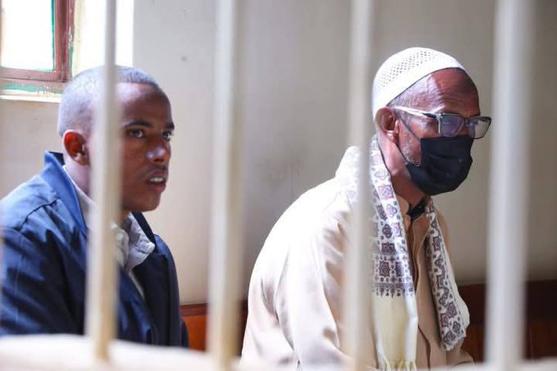 The DusitD2 terror attack convicts in court./ODPP
The DusitD2 terror attack convicts in court./ODPP
A Kenyan court has sentenced a 61-year-old madrassa teacher to 30 years in prison for his role in facilitating the 2019 terrorist attack at Nairobi’s Dusit D2 Hotel complex, which left 21 people dead and many others injured.
The ruling was delivered at the Kahawa Anti-Terror Court, where Mohamed Abdi Ali was found guilty of 14 counts of facilitating a terrorist act and one count of conspiracy to commit a terrorist offence.
He was handed 15 years for each facilitation charge, to run concurrently, and an additional 15 years for the conspiracy charge.
In the same case, 22-year-old Hussein Mohamed Abdille Ali was sentenced to 15 years for conspiracy and another 15 years for facilitation. His sentences will run consecutively, bringing his total to 30 years.
The court linked both men to the January 15, 2019, attack at the high-end hotel and business complex, where Al-Shabaab gunmen stormed the premises, killing 21 people, including several foreign nationals.
Lady Justice Diana Kavedza said the court was convinced that the prosecution had proven its case beyond reasonable doubt. She described the events of that day as devastating and traumatic, not just for those injured, but for the families of those who died and the broader community affected by the attack.
Victim impact statements presented to the court painted a picture of deep and lasting suffering.
Joseph Spindler, father of American victim Jason Spindler, told the court how his son’s death had left an unhealing wound.
“Your Honor, I’m not here for revenge but for justice. Jason was a survivor, a doer, and a visionary. He deserved a future, not a grave marked by the shrapnel from a terrorist’s suicide vest,” he said.
A report from the Probation and Aftercare Service described the experience of another survivor who still has bullets lodged in his body, resulting in ongoing health complications and overwhelming medical bills.
The attack also left a lasting economic impact. Before the attack, the Dusit D2 complex enjoyed full occupancy and high foot traffic, with around 2,500 people visiting daily.
After the incident, occupancy dropped to 55 per cent and daily visitors fell to around 200.
During sentencing, the Director of Public Prosecutions called for the maximum penalty.
The prosecution team, led by Assistant Director Duncan Ondimu and Principal Prosecution Counsels James Machira and Kennedy Amwayi, argued for a strict sentence to serve as a warning to those who support terrorist activities.
Justice Kavedza emphasized that the judgment was not only about accountability but also closure.
“Kenyans remember the fear, the pain, and the trauma. But more importantly, they remember the courage of the victims—those who lost loved ones, their jobs, their businesses, and those still bearing physical scars,” she said.
She also noted that the attack sparked one of the most comprehensive counter-terrorism investigations in Kenya’s history, targeting not just the attackers but those who enabled the operation behind the scenes.
With testimony from 45 witnesses, the court concluded that both convicts played significant roles in enabling the attack.
The judgment is being viewed as a strong statement that Kenya's justice system will pursue all who support terrorism, directly or indirectly.











